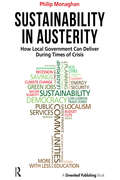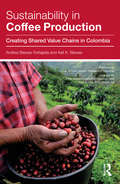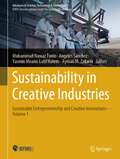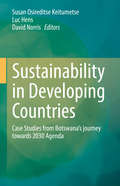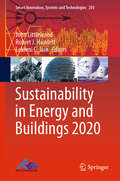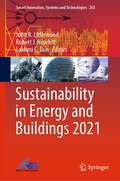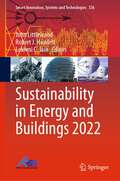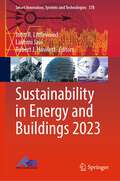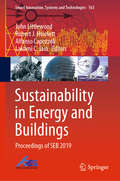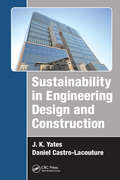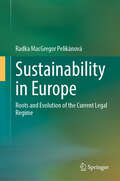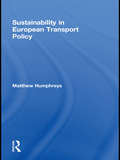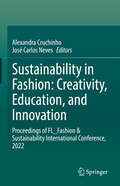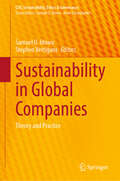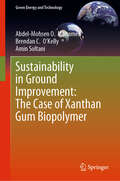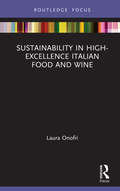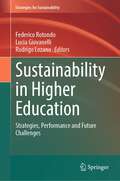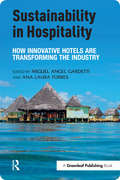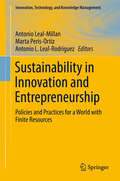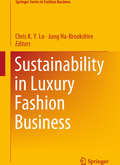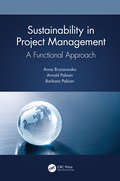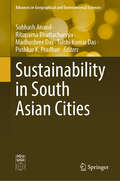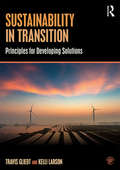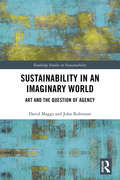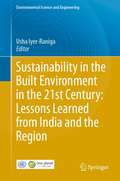- Table View
- List View
Sustainability in Austerity: How Local Government Can Deliver During Times of Crisis
by Philip MonaghanAs the economic crisis of 2008/09 unfolded, it became apparent that the huge mountains of debt being built up by central governments were unsustainable and that savage cuts would be needed to balance budgets. It also became clear that the public sector would be one of the first in line when the axe started swinging. Yet, at the very same time, green advocates from business, academia and civil society were making calls for greater investment at the local level in the big sustainability issues of the day such as fostering sustainable consumption or educating communities on making the transition to a low-carbon economy. The upshot is that leaders in local government are going to be asked to do a lot more work on environmental and social sustainability but with much less money. To make matters worse, increasing public scepticism about why we should deal with these dilemmas in the first place has been exacerbating the problem, notably exemplified by concerns over the robustness of the science of climate change. Local sustainability faces a perfect storm. Sustainability in Austerity has been written to provide local leaders with a lifebelt in these turbulent times. It empowers local authorities to address the challenges they now face – by offering a treasure chest of cost-neutral and powerful ways for leaders in local government to advance sustainability as nations emerge from the global recession. The book sets out the required rules for leadership and proposes a myriad of innovative strategies for self-help achieved through habit-forming behaviour change among council members, staff and local communities alike. Packed with international case studies, anecdotes and management tips derived from a wealth of learning by like-minded peers across the world – all of whom have faced and overcome serious sustainability challenges – the book will be a touchstone for professionals working in areas such as: democracy and decision-making; corporate assets and resources; economic development and planning; waste and environmental services; fleet and logistics; and community management. There is an impressive array of books that provide fresh and innovative thinking on sustainability, but the vast majority have ignored or overlooked inspirational stories of positive change in local government. Sustainability in Austerity is a game-changing book and will be essential reading for managers and councillors in local government across the world, in either emerging or developed economies; managers in central government; community organisation leaders; academics; and management consultants who work with this sector on policy and performance.
Sustainability in Coffee Production: Creating Shared Value Chains in Colombia
by Asit K. Biswas Andrea Biswas-TortajadaCoffee, as a commodity and through its global value chains, is the focus of much interest to achieve fair trade and equitable outcomes for producers, processors and consumers. It has iconic cultural and economic significance for Colombia, which is one of the world's major coffee producers for the global market. This book examines sustainable coffee production in Colombia, specifically the initiatives of Nestlé to create shared value. It describes the transformation of the coffee landscape by the development of economically, socially and environmentally viable and dedicated supply chains. Suppliers have been encouraged to shift production and quality paradigms, in order to develop long-term and sustainable strategies for higher value and premium quality products. This has been partially achieved by establishing a robust partnership with the Coffee Growers Federation and other public, private and social actors, thereby taking control of the institutional architecture and knowledge base that exists in the country. The book provides an important lesson of corporate social responsibility and the creation of shared value for the benefit of farmers, corporations and consumers.
Sustainability in Creative Industries: Sustainable Entrepreneurship and Creative Innovations—Volume 1 (Advances in Science, Technology & Innovation)
by Muhammad Nawaz Tunio Angeles Sánchez Yasmin Moanis Latif Hatem Ayman M. ZakariaThis book discusses a compelling array of topics at the intersection of entrepreneurship, education, and technological innovation within the creative industries. It delves into a captivating exploration of sustainable entrepreneurship in Part 1, where key characteristics of sustainable entrepreneurs and factors influencing entrepreneurial intention are dissected. By unearthing the nexus between entrepreneurial alertness, networking capability, and venture performance, it provides intriguing insights into sustaining traditional crafts and brands amid the COVID-19 pandemic. The following parts not only unveil current innovative pedagogical strategies in creative design education but propels you into the future, exploring the harmonious fusion of academia and industry in sustainability-driven programs. Designed for educators, students, researchers, and practitioners in entrepreneurship, design, and technology fields, this book offers a transformative journey into sustainable practices, innovative pedagogies, and cutting-edge advancements. Engaging, informative, and thought-provoking, it is a must-read for those seeking to shape the future of creative industries through entrepreneurship, education, and innovation.
Sustainability in Developing Countries: Case Studies from Botswana’s journey towards 2030 Agenda
by Susan Osireditse Keitumetse David Norris Luc HensThis book illustrates an alternative approach to ‘state of sustainability’ reporting by presenting cross-sectoral and multi-disciplinary discussions on sustainability issues in the context of a developing country, Botswana. The book volume illustrates how academic publishing can supplement African governments' existing forms of reporting on sustainability by providing on-ground detailed descriptions and experiences relating to achievement of the various sustainable development goals (SDGs). In addition, this process involves, increases and enhances diversity of stakeholders that report on sustainability. Furthermore, the approach resonates with the UN’s recommendation to build local strategies for implementation of the 2030 agenda for sustainable development. Conventional reporting on sustainability by most African countries is an exercise that is customarily the preserve of designated government ministries. While this form of reporting provides a consistent platform for tracking sustainable development goals, it can also benefit from juxtaposition with in-depth descriptions and experiences provided by academic publishing. Academia, through publishing, provides a framework for on-ground situation-analysis as well as in-depth descriptions of African country’s grass-root experiences, thus allowing for temporal tracking of sustainable development milestones. As this volume illustrates, experiences from the various contributors on this volume highlight different points of departure towards achieving the 2030 agenda. Topics covered include biodiversity, water management, world heritage, environment, education, tourism, gender, institutional approaches to achievement of SDGs, as well as contribution of non-governmental organisations (NGO)'s amongst others.
Sustainability in Energy and Buildings 2020 (Smart Innovation, Systems and Technologies #203)
by Lakhmi C. Jain Robert J. Howlett John LittlewoodThis book contains the proceedings of the 12th KES International Conference on Sustainability and Energy in Buildings 2020 (SEB20) held in Split, Croatia, during 24–26 June 2020 organized by KES International. SEB20 invited contributions on a range of topics related to sustainable buildings and explored innovative themes regarding sustainable energy systems. The aim of the conference is to bring together researchers, and government and industry professionals to discuss the future of energy in buildings, neighbourhoods and cities from a theoretical, practical, implementation and simulation perspective. The conference formed an exciting chance to present, interact and learn about the latest research and practical developments on the subject. The conference attracted submissions from around the world. Submissions for the Full-Paper Track were subjected to a blind peer-review process. Only the best of these were selected for presentation at the conference and publication in these proceedings. It is intended that this book provides a useful and informative snapshot of recent research developments in the important and vibrant area of sustainability in energy and buildings.
Sustainability in Energy and Buildings 2021 (Smart Innovation, Systems and Technologies #263)
by Lakhmi C. Jain Robert J. Howlett John R. LittlewoodThis book contains the proceedings of the 13th KES International Conference on Sustainability and Energy in Buildings 2021 (SEB2021) held in Split, Croatia, during 15–17 September 2021 organized by KES International. SEB21 invited contributions on a range of topics related to sustainable buildings and explored innovative themes regarding sustainable energy systems. The conference formed an exciting chance to present, interact and learn about the latest research and practical developments on the subject. The conference attracted submissions from around the world. Submissions for the Full-Paper Track were subjected to a blind peer-review process. Only the best of these were selected for presentation at the conference and publication in these proceedings. It is intended that this book provides a useful and informative snapshot of recent research developments in the important and vibrant area of sustainability in energy and buildings.
Sustainability in Energy and Buildings 2022 (Smart Innovation, Systems and Technologies #336)
by Lakhmi C. Jain Robert J. Howlett John LittlewoodThis book contains the proceedings of the 14th KES International Conference on Sustainability and Energy in Buildings 2021 (SEB2022) held in Split, Croatia, during September 14–16, 2022, organized by KES International. SEB22 invited contributions on a range of topics related to sustainable buildings and explored innovative themes regarding sustainable energy systems. The conference formed an exciting chance to present, interact and learn about the latest research and practical developments on the subject. The conference attracted submissions from around the world. Submissions for the full-paper track were subjected to a blind peer-reviewed process. Only the best of these were selected for presentation at the conference and publication in these proceedings. It is intended that this book provides a useful and informative snapshot of recent research developments in the important and vibrant area of sustainability in energy and buildings.
Sustainability in Energy and Buildings 2023 (Smart Innovation, Systems and Technologies #378)
by Robert J. Howlett John R. Littlewood Lakhmi JainThis book contains the proceedings of the 15th KES International Conference on Sustainability and Energy in Buildings 2023 (SEB2023) held in Bari, Italy, during September 18–20, 2023, organized by KES International. SEB23 invited contributions on a range of topics related to sustainable buildings and explored innovative themes regarding sustainable energy systems. The conference formed an exciting chance to present, interact, and learn about the latest research and practical developments on the subject. The conference attracted submissions from around the world. Submissions for the full-paper track were subjected to a blind peer-reviewed process. Only the best of these were selected for presentation at the conference and publication in these proceedings. It is intended that this book provides a useful and informative snapshot of recent research developments in the important and vibrant area of sustainability in energy and buildings.
Sustainability in Energy and Buildings: Proceedings of SEB 2019 (Smart Innovation, Systems and Technologies #163)
by Lakhmi C. Jain Robert J. Howlett John Littlewood Alfonso CapozzoliThis volume contains the proceedings of the 11th KES International Conference on Sustainability and Energy in Buildings 2019 (SEB19) held in Budapest, 4th -5th July 2019 organised by KES International in partnership with Cardiff Metropolitan University, Wales, UK. SEB-19 invited contributions on a range of topics related to sustainable buildings and explored innovative themes regarding sustainable energy systems. The aim of the conference was to bring together researchers, and government and industry professionals to discuss the future of energy in buildings, neighbourhoods and cities from a theoretical, practical, implementation and simulation perspective. The conference formed an exciting chance to present, interact, and learn about the latest research and practical developments on the subject. The conference attracted submissions from around the world. Submissions for the Full-Paper Track were subjected to a blind peer-review process. Only the best of these were selected for presentation at the conference and publication in these proceedings. It is intended that this volume provides a useful and informative snapshot of recent research developments in the important and vibrant area of Sustainability in Energy and Buildings.
Sustainability in Engineering Design and Construction
by J. K. Yates Daniel Castro-LacoutureSuccessfully Measure the Benefits of Green Design and Construction Sustainability in Engineering Design and Construction outlines the sustainable practices used in engineering design and construction operations for all types of engineering and construction projects. Aimed at ushering the engineering and construction industry into embracing sustainable practices and green construction techniques, this book addresses sustainability in engineering design and construction operations from a historical and global perspective, and delves into specific sustainability concepts and processes. The book explains the concepts of sustainable development, corporate social responsibility (CSR), the Dow Jones Global Sustainability Index (DJGSI), key performance indicators (KPIs), corporate sustainability, and the triple bottom line (economic, environmental, and social values in design and construction). Relevant to sustainability in every facet of engineering and construction, it also covers life-cycle environmental cost analysis, discusses sustainable engineering and site selection, the economic considerations evaluated when making sustainability decisions, and explains how to measure and quantify sustainable performance and apply these practices in the real world. It also covers project and corporate level sustainability practices, sustainable construction materials and processes, sustainable heavy construction equipment, traditional and alternative energy sources, provides implementation resources for starting and evaluating sustainability programs, and includes a checklist for measuring the sustainability of construction operations. The text contains detailed information on sustainable construction materials and processes, heavy construction equipment, and traditional and alternative energy sources. It presents information on sustainable designs, selecting sustainable sites, designing for passive survivability, designing for disassembly, and the ISO 14,000 standards. It provides implementation resources for starting and evaluating sustainability programs and a checklist for measuring the sustainability of construction operations In addition, it provides definitions of sustainability terms and expressions, as well as case studies, examples, discussion questions, and a list of supplemental references at the end of each chapter. This book provides information on: Definitions for sustainability terms Sources for locating global sustainability requirements Current sustainability issues Environmental laws related to sustainability and their implications Sustainable design Life-cycle cost assessment models Sustainable practices currently being used in the engineering and construction (E&C) industry Corporate-level sustainability practices Project-level sustainability practices Global sustainability trends and implications Sustainable materials Sustainable heavy construction equipment Traditional and alternative energy sources LEED Green Building Rating System Sustainability organizations and certification programs Sustainability implementation resources A summary of sustainable engineering design and construction
Sustainability in Europe: Roots and Evolution of the Current Legal Regime
by Radka MacGregor PelikánováThis book analyses the roots and evolution of the concept of sustainability in Europe and the European Union. As sustainability has always mirrored certain value judgments on justice and priorities, it is suitable for functionalist, analytical, contextual and historical comparisons via multidisciplinary studies combining various branches of the social sciences, law, philosophy, and economics. The aim of this book is to explore the roots and evolution of sustainability, so as to reveal how a European style of sustainability has emerged, one that is inextricably linked to our civilization and history. It identifies linear and cyclical phases with clear trends toward expanding the reach of sustainability, its subjects and their duties. The book offers a multidisciplinary, chronological and contextual overview of the evolution of sustainability until the 21st century, while also addressing its legal regime. Sustainability has many faces and needs to be approached in a dynamic manner through the lens of sustainable development or via a multi-stakeholder model that includes private subjects and corporate social responsibility. Although primarily intended for an audience with an advanced background in law, economics and philosophy, the book will also benefit a more general audience, particularly those who want to learn where the current sustainability concerns and legal regime actually came from.
Sustainability in European Transport Policy
by Matthew HumphreysThe construction of the European Economic Communities in 1950 primarily set out to build an integrated economic zone in which national borders were, to a large extent, overcome. The ability of persons and goods to move freely within the economic zone was seminal in the realisation of economic integration. Underlying this, and therefore an implied necessity for European growth, an effective transport infrastructure was essential. However, with rising awareness of environmental issues, and a closer regard to sustainability of development, European transport systems and their regulation have come under scrutiny. This book sets out a critical analysis of the body of law and policy initiatives that constitute the EU's common transport policy. The development of the transport policy is charted through amending and founding Treaties as well as non-legislative documents. The book uses a model of sustainability as the basis for the analysis as the criteria for sustainable development were set out under Article Eleven of the Treaty on the Functioning of the European Union. However, sustainable development, when taken in the context of transport is difficult to reconcile with unbridled economic growth and unchecked freedom of movement and the book identifies a contradiction at the heart of European policy which can only become more accentuated as environmental trends become more explicit. The book argues that European regulation will eventually be forced to recognize this dichotomy, and take more forceful action to protect environmental and social development, even at the cost of economic progress. This book will be of great interest to researchers and students on European Union law and policy courses, transport studies courses and European integration courses. The book is of relevance to all those interested in environmental and transport matters.
Sustainability in Fashion: Proceedings of FL_Fashion & Sustainability International Conference, 2022
by Alexandra Cruchinho José Carlos NevesSustainability in Fashion: Creativity, Education, and Innovation is a book that focuses on how sustainability can be integrated into the fashion and clothing industry. The set of chapters provides peer-reviewed research covering a wide range of topics, mainly focused on how sustainability can be incorporated into fashion and textile education, how consumer behaviour and marketing affect sustainability in fashion (and vice versa) and how circular economy principles can be incorporated into clothing and textile supply chains. The chapters in this proceedings volume examine sustainability not only from the perspective of academia, but also from the perspective of industry. Working across sectors in this manner can facilitate the development of real projects that can greatly contribute to sustainability in the fashion industry.
Sustainability in Global Companies: Theory and Practice (CSR, Sustainability, Ethics & Governance)
by Samuel O. Idowu Stephen VertigansThis textbook focuses on how sustainability is practiced in companies in different sectors of the global economy - examples include aviation, banking, energy, financial services, food, manufacturing, technology, transportation, and tourism. These corporate sectors are at the forefront of the debate around business and sustainability both in their usage of finite resources and their potential to deliver meaningful solutions. Consequently, several experts were brought together for this book and asked to focus on how sustainability is understood and practiced in different companies around the globe in terms of the UN Sustainable Development Goals 2030. Chapters incorporate theoretical and applied examples that can help improve levels of insight into international business approaches. They provide opportunities to learn and disseminate factors that are delivering short, medium, and long-term solutions and problems. These insights can incorporate the spectrum of activities required inorder to achieve sustainability through industrial processes, supply chains to consumer behavior. The multi-disciplinary nature of the fundamental issues also prompted a diverse selection of academics and practitioners across disciplines who have knowledge and/or experiences of sustainability and international business theories, practices, and processes. Students and academics from across related disciplines, corporations, policymakers, and members of societies who study or have an interest in sustainable development will particularly find this book useful.
Sustainability in Ground Improvement: The Case of Xanthan Gum Biopolymer (Green Energy and Technology)
by Abdel-Mohsen O. Mohamed Brendan C. O’Kelly Amin SoltaniSustainable soil stabilization solutions aim to maintain a perfect balance between infrastructure performance and the social, economic and ecological processes required to sustain human equity, diversity, and the functionality of natural systems. To this end, biopolymers, either chemically synthesized from biological matter or biosynthesized by living organisms, are exhibiting great promise as a financially competitive and green alternative for conventional calcium-based binders. Recent experimental studies have shown that soils stabilized by polysaccharide-type biopolymers, such as xanthan gum (XG), exhibit a variety of promising physical and mechanical treatments, including improved water-retention capacity, reduced compressibility and hydraulic conductivity, enhanced shear strength, and improved resistance against wind/water erosion. Despite these advancements, the existing literature reveals numerous inconsistencies, and a thorough understanding of the behaviour/properties of XG-treated soils under diverse loading and environmental conditions remains somewhat elusive. More importantly, there remains a notable gap in understanding how different factors affect the interactions between XG and various soil types throughout the processes of mixing, curing, and later environmental exposure. This book represents the first of its kind, offering a comprehensive, fundamental overview of the current state of XG usage for sustainable ground improvement, while also identifying future research directions towards addressing existing gaps in knowledge and application.
Sustainability in High-Excellence Italian Food and Wine (Routledge Focus on Environment and Sustainability)
by Laura OnofriThis book presents contemporary case studies on selected Italian food and wine products to explore how traditional production and consumption models address and adapt to the sustainability challenges in the Italian high-excellence agri-food sector. Sustainability in High-Excellence Italian Food and Wine adopts a transaction cost economics approach, which is applied to five case-study chapters, each focusing on a key Italian agri-food product: Parmigiano Reggiano, Mozzarella di Bufala Campana, Amarone wine, Prosecco wine, and Prosciutto di San Daniele. The production and organization of these products face many challenges as they seek to balance competing priorities around economic viability, maintenance of high-quality standards and environmental and social impacts. The book argues that the development of sustainable and quality models requires changes to the structure and organization of the supply chain while also acknowledging that consumers are increasingly demanding authentic, high-excellence products that require reliable labeling systems and designations of origin mechanism. Recommending that hybrid structures, such as cooperatives and consortia, are the most cost-minimizing governance structures for the production, the book highlights that in the case of Italian excellency food, environmental sustainability and economic efficiency are not actually traded off but are reciprocally valorized through the regulation of high-quality standards. This book will be of great interest to students and scholars of food and wine excellence products, food systems and supply chains, agricultural production and economics and sustainable consumption.
Sustainability in Higher Education: Strategies, Performance and Future Challenges (Strategies for Sustainability)
by Rodrigo Lozano Federico Rotondo Lucia GiovanelliThis contributed volume addresses the issue of how higher education institutions can systematically reorient themselves to help society become more sustainable. In particular, a strategic management approach is used to overcome the fragmentation of sustainability initiatives increasingly conducted by higher education institutions worldwide. In this book, eminent scholars in the field of sustainability in higher education combine their different backgrounds to propose conceptual frameworks for interpreting and measuring sustainability integration in higher education institutions. The chapters contained herein explore which processes and management tools should be used, as well the challenges to be faced, to make sustainable innovation effective. The cases present in this volume offer a guide for higher education institution management to lead the sustainability transition.
Sustainability in Hospitality: How Innovative Hotels are Transforming the Industry
by Miguel Angel Gardetti Ana Laura TorresThis ground-breaking research represents the most complete collection yet on how the hospitality industry is addressing sustainability and ethical issues. Covering supply chain management, innovative sustainability initiatives, CSR programmes, biologically-respectful tourism and Value Creation, Sustainability in Hospitality: How Innovative Hotels are Transforming the Industry presents valuable global viewpoints on embedding sustainability into all aspects of the hospitality industry, and the impact this could have on transforming the sector into an advocate for more sustainable, eco-conscious tourism.The chapters in this edited collection span organizational governance, human rights and labour practices, environment and climate change, fair operating practices, stakeholder engagement, CSR and strategic management. The global reach of the collection brings case studies from China, the US, the UK, Mexico and Italy, while company case studies include Fairmont Luxury Hotels and Sextantio.Sustainability in Hospitality: How Innovative Hotels are Transforming the Industry will be an essential read for academics researching the development of ethically-conscious and sustainable hospitality, and for hotel managers and group CEOs who want to know how sustainability and CSR can be embedded in their day-to-day operations.
Sustainability in Innovation and Entrepreneurship
by Marta Peris-Ortiz Antonio Leal-Millan Antonio L. Leal-RodríguezThis book provides a richly illustrated study of sustainability, innovation and entrepreneurship. Specifically, it examines the ways in which governmental policies and practices modify the social conditions necessary to promote innovation in businesses and by so doing impact economic development. Exploring topics such as green innovation, green customer capital, smart cities, green entrepreneurship and environmental responsibility, this book presents some of the most current research and best practices in the field. In today's global economy, strategies, policies and practices that address the negative effects of human activity on the environment need to be incorporated into the business framework in order for companies to achieve a sustainable competitive advantage. Around the world, such changes have already resulted in a broad range of products, production methods and technical features that ensure environmental protection. At the same time, the mass media's communication of a deteriorating earth have motivated a growing number of citizens in both developed and developing nations to modify their consumption habits towards more ecological products. Consequently, an increasing number of companies are reacting to these changes in business and legal frameworks and consumer preferences by investing in new forms of green innovation or "eco-innovation" designed to promote both environmental and corporate sustainability. For example, Hewlett-Packard eliminated lead from its welding process; Wal-Mart reduced the emissions of their suppliers; and Cisco, Dell and IBM are investing in smart grids. This volume showcases pioneering efforts among companies, citizens, and government agencies that are moving from theory to practice by placing sustainability at the core of their development strategies.
Sustainability in Luxury Fashion Business (Springer Series in Fashion Business)
by Chris K. Y. Lo Jung Ha-BrookshireThis book explores new approaches and strategies that luxury fashion brands could adopt in their operations toward sustainability goals. It addresses the unique challenges faced by luxury fashion brands, given that concepts of luxury and sustainability may be conflicting. In doing so, it elaborates on how fashion brands need to manage their suppliers to comply with and improve social and environmental conditions, the pressure to fulfill the triple-bottom lines, consumer demands for transparency, and social media and its advantages in achieving sustainability goals. Exploring the notion that luxury fashion brands are in a better position to pursue superior sustainability performance, it presents research that highlights how the consequences of non-compliance could have more devastating effects on luxury brands than on mass-market brands. The book is a valuable resource for academics and practitioners in the field of business, sustainability, and fashion.
Sustainability in Project Management: A Functional Approach
by Anna Brzozowska Arnold Pabian Barbara PabianThis book presents a new approach to the issue of project management, showing how it can be approached through the lens of sustainability. The nature of sustainable project management is not only to achieve economic goals, but also environmental and social ones. Considering project management from the perspective of sustainability is very important because sustainable development cannot keep up with the pace and scale of accumulation of ecological and social problems. The natural potential of the Earth is quickly running low. The global equilibrium between the Earth’s ecosystems, which have developed for millions of years, and the human world of production and consumption, becomes disrupted. The focus is on a functional approach to the subject, allowing management and business to implement the methodology discussed. Topics discussed include sustainable planning, sustainable organizing, sustainable leading and sustainable controlling. The authors use their combined experience in the area to inform their novel approach. The book will be especially useful for people who are project managers, members of project teams and other project stakeholders. It may also be a useful reference for scientists and students studying the fields of management, IT and business.
Sustainability in South Asian Cities (Advances in Geographical and Environmental Sciences)
by Subhash Anand Rituparna Bhattacharyya Pushkar K. Pradhan Madhushree Das Tulshi Kumar DasThis book explores some of the common socio-economic and environmental challenges faced by the cities of South Asia, which remain highly under-researched. South Asia comprises eight nations—India, Bangladesh, Nepal, Sri Lanka, Bhutan, Maldives, Pakistan, and Afghanistan, consisting of a total population of 1.92 billion in 2022. The majority of the cities in these countries are characterized by haphazard urbanization and multi-dimensional poverty alongside its associated ingredients— floods, water scarcity, food crises, poor sanitation, slums and squatter settlements, and pollution, among others. This comprehensive book is contributed by interdisciplinary scholars and includes 25 case studies. The volume brings these socio-economic and environmental challenges to the fore for a better and more nuanced understanding. The book help policymakers to mitigate the challenges and build sustainable cities.
Sustainability in Transition: Principles for Developing Solutions
by Travis Gliedt Kelli LarsonSustainability in Transition: Principles for Developing Solutions offers the first in-depth education-focused treatment of how to address sustainability in a comprehensive manner. The textbook is structured as a learning-centered approach to walk students through the process of linking sustainable behavior and decision-making to green innovation systems and triple-bottom-line economic development practices, in order to achieve sustainable change in incremental to transformational ways. All chapters combine theory and practice with the help of global case study and research study examples to illustrate barriers and best practices. Each chapter begins with learning objectives and ends with a 'check on learning' section that ties the main points back to the core themes of the book. Chapters include a section focused on measuring progress and a box comparing international research or case studies to the North American focus of the chapter. A list of additional academic sources for students that complement each chapter is included. Building sustainability tools, techniques, and competencies cumulatively with the help of problem- and project-based learning modules, Sustainability in Transition: Principles for Developing Solutions is a comprehensive resource for learning sustainability theory and doing sustainability practice. It will be essential reading for advanced undergraduate and graduate level students who have already completed introductory sustainability classes.
Sustainability in an Imaginary World: Art and the Question of Agency (Routledge Studies in Sustainability)
by John Robinson David MaggsSustainability in an Imaginary World explores the social agency of art and its connection to complex issues of sustainability. Over the past decade, interest in art’s agency has ballooned as an increasing number of fields turn to the arts with ever-expanding expectations. Yet just as art is being heralded as a magic bullet of social change, research is beginning to throw cautionary light on such enthusiasm, challenging the linear, prescriptive, instrumental expectations such transdisciplinary interactions often imply. In this, art finds itself at a treacherous crossroads, unable to turn a deaf ear to calls for help from an increasing number of ostensibly non-aesthetic fields, yet in answering such prescriptive urgencies, jeopardizing the very power for which its help was sought in the first place. This book goes in search of a way forward, proposing a theory of art aiming to preserve the integrity of arts practices within transdisciplinary mandates. This approach is then explored through a series of case studies developed in collaboration with some of Canada’s most prominent artists, including internationally renowned nature poet Don McKay; Italian composer and Head of Vancouver New Music, Giorgio Magnanesi; the renowned Electric Company Theatre, led by Kevin Kerr; and finally through a largescale multimedia installation aiming to reimagine the relationship between climate, culture, and human agency. Sustainability in an Imaginary World will be of great interest to students and scholars of arts-based research fields, sustainability studies, and environmental humanities.
Sustainability in the Built Environment in the 21st Century: Lessons Learned from India and the Region (Environmental Science and Engineering)
by Usha Iyer-RanigaThis book follows on previous works addressing sustainable development research in the Asia-Pacific region. It mainly focuses on India, a country currently facing immense challenges in the form of climate change, rapid urbanisation, and population pressures in its journey to help achieve the Sustainable Development Goals. Expecting to surpass China in terms of population in the near future, India needs to develop its own solutions in order to uphold its commitments under the Paris Agreement. This book makes a contribution in that direction by presenting case studies on various aspects of the built environment, from education to managing cities, procurement, and considerations for a circular economy. The papers gathered here offer a vital resource for government policymakers, educators, and current and future professionals, equipping them with the knowledge and expertise they need in order to overcome today’s complex challenges in the built environment.
